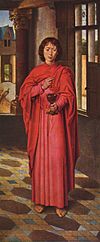Apostle John
| Saint John the Apostle | |
|---|---|
 |
|
| Apostle | |
| Born | c. AD 6 Bethsaida, Galilee, Roman Empire |
| Died | c. AD 100 (aged 93 or 94) Patmos, Greece, Roman Empire |
| Venerated in | Christianity |
| Canonized | Pre-congregation |
| Feast | 27 December (Roman Catholic, Anglican) 26 September (Orthodox) |
| Attributes | Book, a serpent in a chalice, cauldron, eagle |
| Patronage | Love, loyalty, friendships, authors, booksellers, burn-victims, poison-victims, art-dealers, editors, papermakers, publishers, scribes, scholars, theologians |
John the Apostle (Aramaic: ܝܘܚܢܢ ܫܠܝܚܐ Yohanan Shliha; Hebrew: יוחנן בן זבדי Yohanan ben Zavdi; Koine Greek: Ἰωάννης; Latin: Ioannes; c. AD 6-100) was one of the Twelve Apostles of Jesus according to the New Testament, which refers to him as Ἰωάννης. He was the son of Zebedee and Salome. His brother was James, who was another of the Twelve Apostles. Christian tradition holds that he outlived the remaining apostles and that he was the only one to die of natural causes: Judas Iscariot died by suicide, while the other ten all are considered to have died a martyr's death. This is because the Church Fathers considered him the same person as John the Evangelist, John of Patmos, John the Elder and the Beloved Disciple, although modern theologians and scholars have not formed a consensus on the relative identities of these men. The traditions of most Christian denominations have held that John the Apostle is the author of several books of the New Testament.
Church tradition has held that John is the author of the Gospel of John and four other books of the New Testament — the three Epistles of John and the Book of Revelation. In the Gospel, authorship is internally credited to the "disciple whom Jesus loved" (ὁ μαθητὴς ὃν ἠγάπα ὁ Ἰησοῦς, o mathētēs on ēgapa o Iēsous) in John 20:2. John 21:24 claims that the Gospel of John is based on the written testimony of the "Beloved Disciple". The authorship of some Johannine literature has been debated since about the year 200. Some doubt that the "Gospel of John" was even written by an individual named "John" (Ἰωάννης or יוחנן). Nevertheless, the notion of "John the Evangelist" exists, and is still considered by some the same as the Apostle John.
...
Wikipedia
